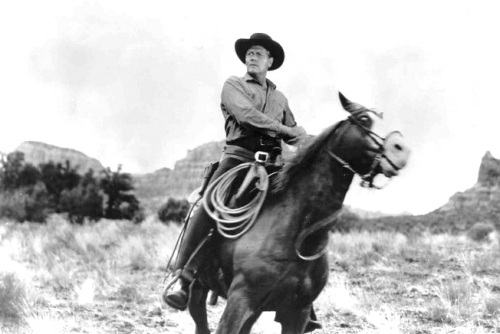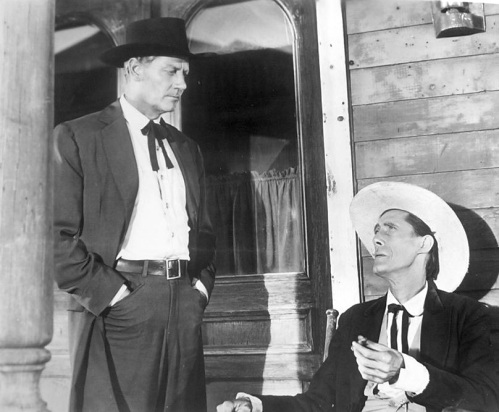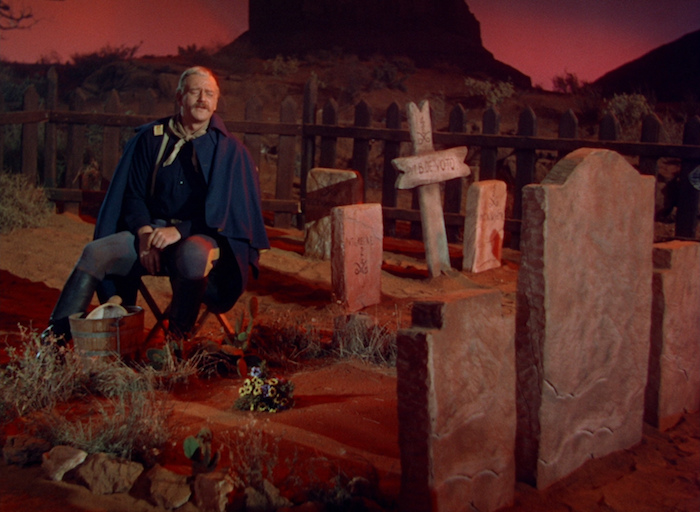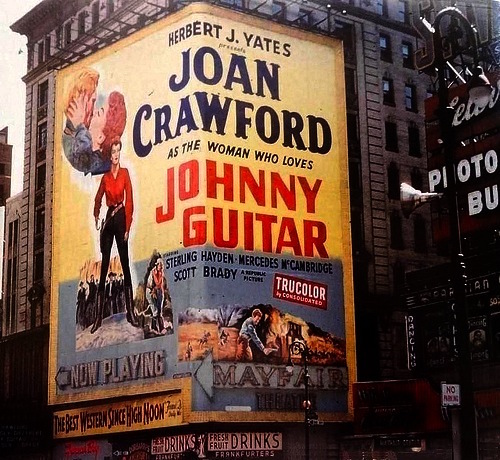
Directed by Jacques Tourneur
Screenplay by Herb Meadow and Don Martin
From a novel by Louis L’Amour
Cinematographer: Ray Rennahan
Film Editor: William B. Murphy
Music by Paul Dunlap
Cast: Joel McCrea (Judge Rick Thorne), Miroslava (Amy Lee Bannerman), Kevin McCarthy (Tom Bannerman), John Carradine (Col. Buck Streeter), John McIntire (Josiah Bannerman), Nancy Gates (Caroline Webb)
 I missed Stranger On Horseback (1955) on its first run in the UK. as the support feature to the very popular Marty.
I missed Stranger On Horseback (1955) on its first run in the UK. as the support feature to the very popular Marty.
My interest was aroused by a February 1963 edition of Motion which had a comment on the film by the esteemed Raymond Durgnat. Mr Durgnat was the doyen of a new breed of young English cineaste film writers. Durgnat’s impression of the film was as follows: “In Stranger On Horseback (a disturbing little Jacques Tourneur Western), Joel McCrea comes across Miroslava (ex Archimboldo) who is clad throughout in black leather, boots, gloves, and of course whip. SHE comes across HIM bathing naked in a pool and though the scene is censored, it looks as if it builds up to the scene in Duel In The Sun where Gregory Peck waits for Jennifer Jones to emerge from among the reeds where she is cowering and shivering. The film also has a moment of Hawksian moral sadism; the weak willed sheriff (Emile Meyer) finally accepts the necessity for violence and blasts away at the crooks with a shotgun. “How d’you like it?” asks McCrea. “Loathesome,” replies Meyer grinning broadly.”

The plot of Stranger On Horseback is pretty straightforward: a circuit judge (McCrea) wants to get the goods on an unsolved murder committed by the son (Kevin McCarthy) of a local king-pin (John McIntire). Tourneur graces the film with plenty of quirky offbeat touches that range from the humorous to the subversive.
The only available version of the film is on DVD from VCI, obtained from a print sourced from the vault of the British Film Institute. Sadly, this print is in bad shape — the lovely Sedona locations appear washed out. Hopefully, a master neg may surface or perhaps the film will be restored, like the previously considered lost Seven Men From Now (1956). It’s amazing what can be done these days, just consider the wonderful restoration done by Ignite Films on Canadian Pacific (1949) and The Cariboo Trail (1950). We live in hope. Not only is Stranger On Horseback Tourneur… it’s very good Tourneur.

The film runs a mere 66 minutes, which suggests the film may have been censored — most of McCrea’s Fifties programmers clocked in at around 80 minutes. The film was an initial independent effort from producer Leonard Goldstein who previously had a splendid track record at Universal and Fox. Sadly, Mr. Goldstein passed away at the tender age of 51, before Stranger On Horseback was released. Goldstein also produced Saddle Tramp (1950), the best of McCrea’s six Universal Fifties Westerns.
McCrea had choice of director on Stranger On Horseback. He chose Tourneur, who previously made the wonderful Stars In My Crown (1950), a film which sadly failed to find an audience. Tourneur also directed McCrea’s next picture Wichita (19XX), the first of four films that he made for Allied Artists. Wichita was far and away the best of the four and scored at the box office.

The bad guy in Stranger On Horseback is Kevin McCarthy, who impressed McCrea. He told the young actor, “I’m going to tell the studios all about you.” I have often wondered if this lead to McCarthy’s most iconic role in Invasion Of The Body Snatchers (1956). After all, producer Walter Wanger had produced one of McCrea’s biggest hits, Foreign Correspondent (1940). Wanger and McCrea were working out of Allied Artists at the same time. Furthermore; Sam Peckinpah played a bank teller in Wichita and a meter reader in Invasion Of The Body Snatchers, Sam has often cited Don Siegel as his mentor.
Don Siegel had previously tried to develop Bad Day At Black Rock at Allied Artists. He wanted McCrea to play the lead. With all due respects to Spencer Tracy and John Sturges, John at the very fine Greenbriar Picture Shows feels the McCrea/Siegel film would have been superior. I totally agree. And I might hasten to add that I will be first in line when Warners releases the Blu-Ray version of Sturges’ film.

Had McCrea appeared in Bad Day At Black Rock and not turned down the Van Heflin role in Shane (1953) this surely would have had a huge boost to his star power which faded considerably in the late Fifties.As much as we all love his Westerns I would have loved to have seen him tackle some of the non Westerns roles played by Cooper and Stewart in the Fifties. McCrea’s reason for turning down Shane was two-fold: he did not feel he was at a time in his career to take secondary roles; plus, he did not want to detract from his friend Alan Ladd. McCrea, in typical modesty, stated that he could never had been as good as Heflin was. I totally disagree especially under George Stevens’ direction.

An amusing snippet: one day, Ladd asked his pal McCrea, “What do you do when the phone doesn’t ring… when nobody wants you?” McCrea jokingly replied, “I slap my wife on the butt, jump on my horse and ride around the ranch.” This flippant attitude was totally alien to the increasingly insecure Ladd.
From the mid to late Fifties, McCrea often worked for directors who were a far cry from the likes of Hawks, Hitchcock, Wyler, Wellman, Sturges and Walsh — whom he worked for in his glory days. It’s a shame that Tourneur or Siegel didn’t direct films like The Oklahoman or Trooper Hook (both 1957), especially with their subtext of alienation and racism. Both directors made wonderful films that shared those themes. Things did improve when Joseph Newman came on board, a vast step up from the likes of Francis D. Lyon and Charles Marquis Warren.
Despite the late Fifties drop off in quality (apart from the Newman efforts, especially 1958’s Fort Massacre), McCrea has left a hugely impressive body of work. It is also encouraging that many major stars, from Katherine Hepburn to Clint Eastwood, feel McCrea was grossly underrated.
Read Full Post »






























